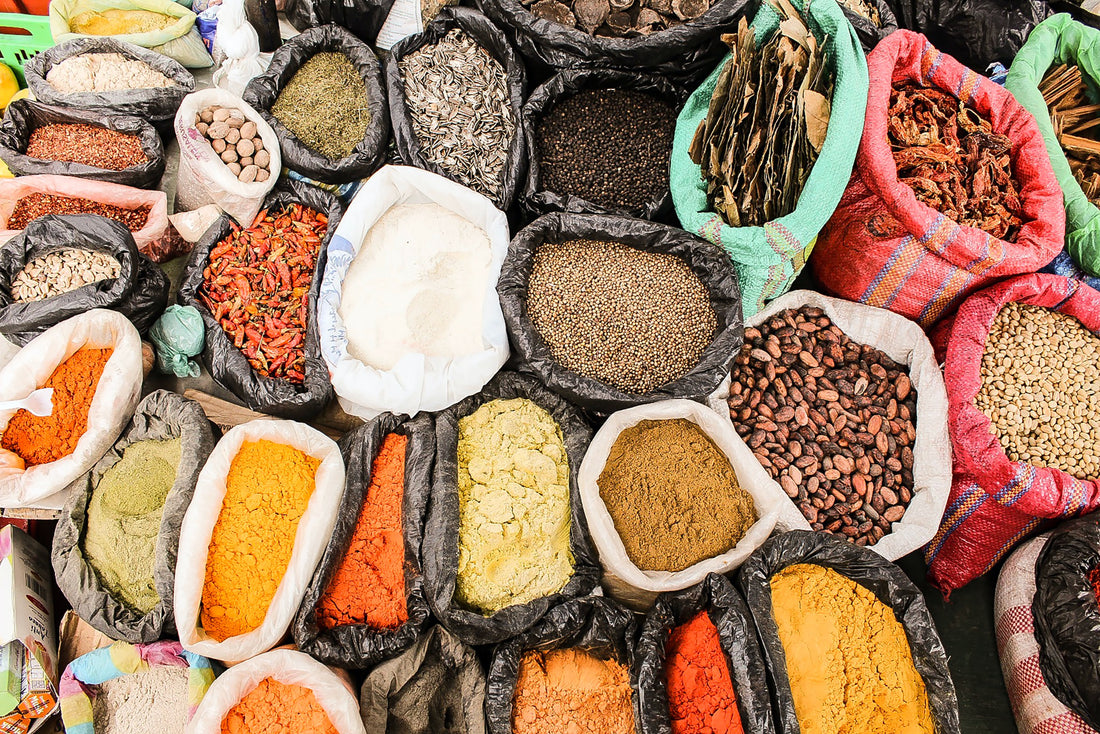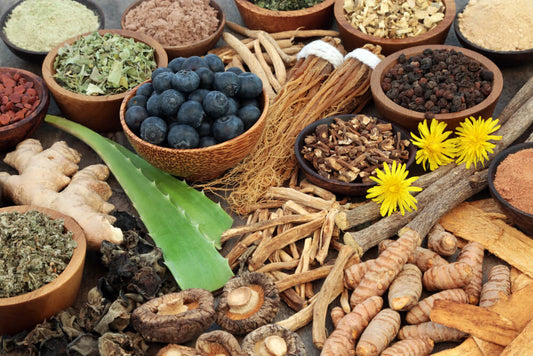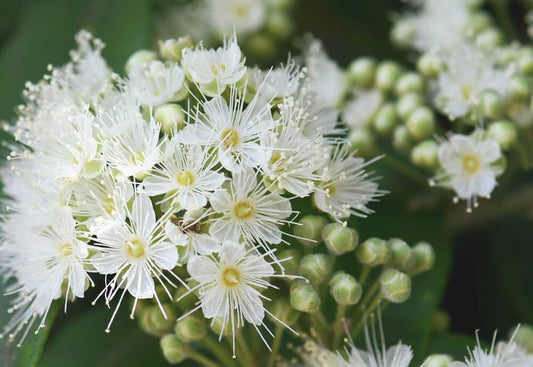
What Everybody Needs to Know About Herbal Tonics
Google the terms “tonic herbs” or “herbal tonics” and the web will give you a plethora of definitions and examples. These definitions can vary to the point that it can get confusing for people who are still new to tonic herbalism.
To clear up any confusion, we answered some of the most frequently asked questions about tonic herbs and tonic herbalism. If this your early in the herbal tonics game, keep reading to find out more.
What are herbal tonics?

When delving into tonic herbalism, you need to identify some of the most important terms first. Below are the three of the key terms you certainly need to know.
Tonic – it basically means anything that has an invigorating effect to your body or promotes general good health and wellness.
Tonic herbs – these are specific plant and mushroom (fungus) species or herbs that are meant for long term consumption to support the body’s overall balance and well-being. Best examples of these are licorice, tea leaves, medicinal mushrooms, and other herbs.
Herbal tonics – these are the finished products or herbal formulas that are made of tonic herbs. They come in several forms like capsules, powdered extracts, and tinctures and can help to enhance your everyday wellness.
Keep in mind that no matter what definition or description you get, they all lead to one thing: it’s the fact that tonic herbs are meant to improve one’s physical, mental, and emotional well-being. And it would be a shame not to take advantage of these health benefits, right?
What are the types of herbal tonics?
On the surface, tonic herbalism is simply all about constantly improving your general health and overall wellness by taking tonic herbs. But if we’re going to dig deeper, it can get a little more complex than that.
Think of tonic herbalism as an umbrella that arches over different categories of tonic herbs. These herbs were used by practitioners of traditional Chinese medicine and ancient Ayurvedic medicine in India for thousands of years to support different body systems
Simply put, whatever health result you want to achieve, there’s a specific type of herb for that. Below are these categories:
1. Adaptogens
In herbalism, adaptogens are the tonic herbs that help the body be more resistant against all kinds of stressors. It doesn’t matter whether they’re physical, chemical, or biological.
There are adaptogenic herbs for long-term stress like the Asian ginseng, adaptogens for acute stress and anxiety, and adaptogens for immunity like the reishi mushroom.
2. Alteratives
Alteratives are tonic herbs that support the body’s natural processes and bodily functions to keep us healthy and restore vitality. Some of the best alterative herbs are cleavers, nettles, and red clovers.
3. Aromatics
Aromatics, on the other hand, are tonic herbs that exude strong aroma. These types of herbs are often the best tonics for essential oils, which are a mainstay in aromatherapy.
Aromatic herbs like ginger, peppermint, and rosemary are also often used to clear respiratory tracts and keep the lungs healthy.
4. Astringents
These are herbs that can cleanse and tighten tissues in the body. Astringents are often transformed into topical tonics that are used to protect and tone the skin. The blackberry roots and leaves, green tea, black tea, rose, white oak, and agrimony are some of the best astringent herbs you can include in your stash.
5. Bitters
Bitters are tonic herbs that support the production of gastric fluids in the stomach to stimulate your appetite and improve digestion. Normally, a drop from herbal tinctures made from bitters is enough to activate the secretion of the beneficial digestive fluids.
Artichokes, dandelion, hops, orange peels, and wormwood are some of the bitters that you must have in your collection.
6. Nutritives
As the name suggests, nutritive herbs are tonics that are rich in nutrients like vitamins and minerals. These types of tonic herbs are perfect for daily consumption to promote the body’s overall well-being and increase energy levels.
What’s the best way to ingest herbal tonics?
What to include in your personal stash of herbal tonics will ultimately depend on your taste and preferences. Good thing they come in several forms to sustain your daily fix of tonic herbs. Below are the many ways you can take your herbal tonics.
- Capsules
- Powdered extract
- Oil infusions
- Syrups
- Teas
- Tinctures
- Topicals
What herbal tonics should you include in your stash?
Lion’s Mane
Lion’s mane mushrooms are white-coloured fungi that have long shaggy spines that resemble that of the lion’s mane. Hence, the name.
This mushroom has been used by several Asian communities for both culinary and medicinal purposes. Lion’s mane mushroom is rich in antioxidants that can fight inflammation and oxidation throughout the body, resulting in tons of potential health benefits.
Lion’s mane may help boost one’s immune system, manage anxiety and depression, improve cognitive function, and so much more. If you want to enjoy some of these health benefits, you should check out Superfoods Australia’s Lion’s Mane Mushroom Extract, Lion’s Mane Mushroom Capsules, and Lion’s Mane Mushroom Tincture.
Pine Pollen

Believe it or not, pollen particles that are produced by plants have been one of key components of traditional and herbal medicines for 2000 years.
Pollens are rich in protein, fatty acids, carbohydrates, Calcium, Magnesium, Vitamin B and Vitamin E. Regular consumption of Pine Pollen Extract or Pine Pollen Capsules is also believed to be beneficial when it comes to slowing down aging, reducing fatigue, and treating normal conditions like colds and constipation.
Superfoods Australia’s pine pollen herbal tonic collection comes from the Masson’s pine tree, which is one of the few plant species where edible and healthy pine pollen can be harvested. Check out the collection here.
Curcumin
You’ve probably heard of turmeric. It’s a spice that’s a staple both in world-renowned restaurants and Indian households. But what you probably didn’t know is that it also contains compounds that have medicinal properties. The most important one is called curcumin.
Curcumin is a strong antioxidant and the main active ingredient of turmeric. It has anti-inflammatory properties that help reduce the risks of getting chronic diseases and Alzheimer’s and minimise the growth of cancer cells.
If you want to include Curcumin in your personal stash, try Superfood Australia’s Curcumin and Piperine Capsules, Curcumin Powdered Extract, or Curcumin + Piperine Green Tea. They’re all extracted from the turmeric root then combined with extracts from organic black pepper seed called Piperine for added benefits.
Reishi Mushroom

The reishi mushroom, also known as Ganoderma lucidum and lingzhi, is a popular medicinal mushroom in Eastern medicine. It’s proven to have anti-cancer, anti-fatigue, and immune-boosting properties. No wonder, it’s called the “Elixir of Life” by traditional medicine practitioners.
You can get the health benefits of reishi no matter how you like your herbal tonic. You can try some of Superfoods Australia’s reishi products like Reishi Mushroom Extract, Reishi Mushroom Softgels, and Reishi Mushroom Spore Oil if you like to mix things up.
Where can you buy herbal tonics in Australia?
Whether you’re just new in tonic herbalism or you’ve already dug deep and ingrained herbal tonics in your daily life, you’ll need a trusted partner like Superfoods Australia for keeping your stash full.
Check out our great collection of superfoods and herbal tonics. Our collection ranges from super mushrooms, berries, teas, and other herbs that will certainly meet your daily nutritional needs.
Feel free to shop around the site and score our products. We deliver the good stuff wherever you are in Australia. We’ll even do it for free if your order’s worth $100 and above.
We also accept Afterpay and ZipPay for hassle-free transactions.













